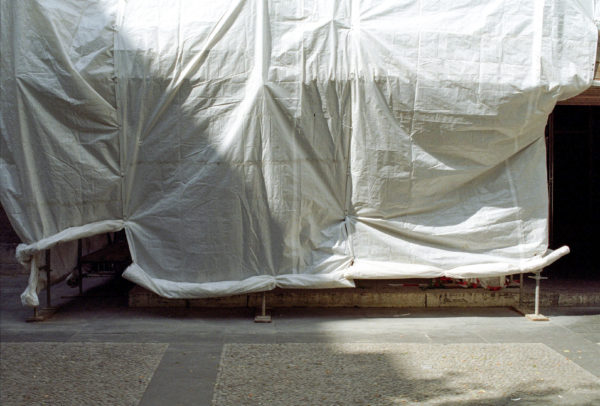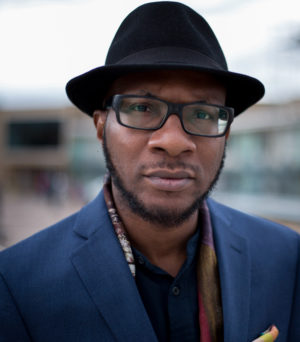
(In Memoriam Bisi Silva. In Memoriam Okwui Enwezor.)
1.
O. shows up in my dream last night. He is standing there as though listening to something. Wearing a dark, beautifully-cut suit, as usual. There’s a great look of concentration on his face. He says nothing but, finally, he takes off his jacket. He folds it carefully, sets it down.
2.
When I hear the terrible news that B. has died, I write to her right away, before I can stop myself, before I can talk myself out of the absurdity of writing to the dead. There’s immediately an automated out-of-office reply.
3.
How many of us loved them both. Our captains. Equal to each other. Unrivalled among the rest.
They were proud of us? We were much prouder of them.
4.
As in, all deaths are singular. To the one who dies and to those who love them, these things are not together. As in, when we go, we go alone. Grieve alone. Grieve singly. In the singular. But also. . . what? But also. What? What is “together”? What is “singly”? Or “grieve.” What.
5.
Death’s only lesson: we die.
6.
Berlin, The Short Century, 2001. Venice, La Biennale, 2015.
7.
O. writes of the “. . . fractious memory of a time lived in the shadow of subjection and born in the deeply unethical code and moral conduct of colonialism.”
Back then I didn’t even know one could write such things.
8.
B. 56/ O. 55.
9.
B. writes of her intention “to strengthen programmatic, curatorial, artistic and discursive parameters of photography in dialogue with the international community.”
Which she did.
10.
K’ọ́jọ́ pẹ́ s’íra, we say in Yoruba. Or ọ́jọ́ á jìnà s’ọ́jọ́ o. Slightly different ways of saying the same thing: “may the days be far from each other.” This is consolation in my mother tongue: the prayer or wish that bereavements, unavoidable though they be, will at least be mercifully spaced out.
11.
The Center for Contemporary Art, Lagos.
12.
B. dies on February 12, 2019.
J. writes to me on February 23, 2019, in our mutual consolation: Ọjọ́ á jìnà s’ọ́jọ́ o.
O. dies on March 15, 2019.
13.
Death’s only lesson: we lived.
14.
From B., learned resistance.
From O., learned persistence.
15.
Insufficiently distant days.
And the things we still need to learn from you.
16.
Memory. The students in Addis Ababa, drawn from all over the continent, how they loved B., and how they adored her for what she could teach them. In Venice, O.’s dazzle and what it was to feel a part of what he was, what he achieved on the biggest stage. We saw the criticisms, of course, we knew what that was all about, can’t fool us.
Public memory, private memory, Lagos, New York. The missed connections: Bamako, Munich.
17.
Memory: about a year ago, meeting L., who had just returned from visiting O. in hospital. Her eyes puffy from crying.
18.
An obituary is different from a lament.
19.
From B., the scintillating possibilities in the local, a local never less than global. Her refusals. How this tilting-against-the-given became a refuge for me.
From O., how to move in a room full of sharks. Man like a scalpel.
20.
Bamako, Recontres de Bamako, 2015.
21.
An admired figure, a friend, a dear friend, a family member, a confidante, a partner. A mild wounding a substantial wounding a derangement an impossibility. All the varying intensities of relation that seek a name in the aftermath.
22.
Death’s only lesson: no one knows what death’s only lesson is.
23.
C. overseeing the mortuary arrangements for O., his own grieving postponed.
24.
Anne Carson’s frequently cited lines from The Glass Essay:
You remember too much,
my mother said to me recently.
Why hold on to all that? And I said,
Where can I put it down.
25.
Death sets off a flurry of reading and writing. Of re-reading. How come so and so feels so alive in my inbox? What is the last email so and so wrote to me?
Archive fever.
26.
“Help me teach these young people how to write. They can’t write!”
“I am so proud of you and all that you bring to literature, the world of ideas, and your insight into cultural practice in general. I continue to read your work avidly.”
This is not an obituary.
27.
“Comparisons are odious”: a usage attested as far back as the 15th century.
But, in contrast, the Igbo proverb that Achebe was fond of citing: “Where one thing stands another will stand by it.”
Sometimes there are two griefs (or more). It is death that is odious.
28.
B. cites the griot Kouyaté: “I teach kings the history of their ancestors so that the lives of the ancients might serve them as an
example, for the world is old, but the future springs from the past.”
29.
From O., how to deal with Europeans: skeptically.
From B., how to deal with Africans: perseveringly.
30.
R. doing memorial work, her mourning looking for an exit now, like someone in a dark room, hands tracing over the walls, not yet able to find the door.
31.
An obituary is for the public, a lament is for the community.
32.
Daudet in In the Land of Pain:
The clever way death cuts us down, but makes it look like just a thinning-out. Generations never fall with one blow—that would be too sad and too obvious. Death prefers to do it piecemeal. The meadow is attacked from several sides at the same time.
33.
“The dead” as a category—into which I am reluctant to admit you. The lament is an obituary that has forgotten its manners. Where can I put it down. Like a jacket removed and folded and set down.
The future springs from the past.
34.
In loss’s dumbfoundery, k’ọ́jọ́ pẹ́ s’íra.
About the Writer:

TEJU COLE is a novelist, essayist, photographer, and curator. His books include Open City, Blind Spot, and, most recently, Human Archipelago.








APPLY TO THE BOOKARTAREA WRITING MASTERCLASS June 26, 2019 11:57
[…] Teju Cole is a writer, photographer, and the author of several books, including Open City and Known and Strange Things. He is currently a professor of creative writing at Harvard. […]